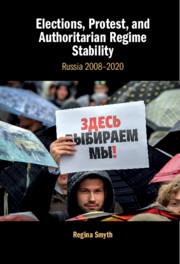Book contents
- Elections, Protest, and Authoritarian Regime Stability
- Elections, Protest, and Authoritarian Regime Stability
- Copyright page
- Dedication
- Contents
- Figures and Tables
- Acknowledgments
- 1 Elections, Protest, and Regime Dynamics
- 2 Winning Elections
- 3 The Long Game
- 4 The Unexpected Power of Weak Opposition
- 5 The Vote Protest
- 6 The Polls Close and Two Movements Emerge
- 7 Protest and Rally Dynamics
- 8 The Perpetual Campaign
- 9 2018–2020
- Book part
- References
- Index
8 - The Perpetual Campaign
Regime Response and Opposition Innovation
Published online by Cambridge University Press: 16 October 2020
- Elections, Protest, and Authoritarian Regime Stability
- Elections, Protest, and Authoritarian Regime Stability
- Copyright page
- Dedication
- Contents
- Figures and Tables
- Acknowledgments
- 1 Elections, Protest, and Regime Dynamics
- 2 Winning Elections
- 3 The Long Game
- 4 The Unexpected Power of Weak Opposition
- 5 The Vote Protest
- 6 The Polls Close and Two Movements Emerge
- 7 Protest and Rally Dynamics
- 8 The Perpetual Campaign
- 9 2018–2020
- Book part
- References
- Index
Summary
Chapter 8 returns to state and opposition contestation between national election cycles. It describes how the regime uses the advantages described in the formal model in Chapter 3 to respond to different electoral contexts, sometimes allowing the opposition to compete and banning them in other cases. In response, the opposition continues to innovate its strategies to generate new information about regime manipulation and the lack of electoral accountability. This process creates a perpetual campaign as the regime and opposition clash over elections at every level of the political system and between elections to shape information environments. The regime is forced to be nimble as it seeks to limit the diffusion of successful opposition strategies and avoid having to reveal new information in national elections. The focus on the Russian case describes regime success in 2016 and 2018 when it engineered victories without provoking protest. It also demonstrates that these efforts moved the regime incrementally in an autocratic direction, generating new political tensions and opposition opportunities. Victory did not end the potential for a breakthrough in the next election.
- Type
- Chapter
- Information
- Elections, Protest, and Authoritarian Regime StabilityRussia 2008–2020, pp. 180 - 203Publisher: Cambridge University PressPrint publication year: 2020

